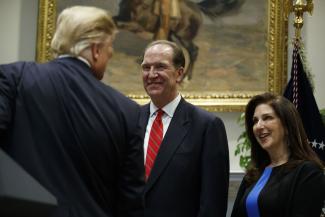Blog
“Poor choice”

Malpass is an official of the Trump administration. The FT’s assessment (paywall) is devastating: “His judgment even on economics, his supposed speciality, is wanting. Notoriously, as then chief economist at Bear Stearns, Mr Malpass was blithely confident about the strength of the US economy in 2007 – a year before the global financial crisis hit and his own employer went under. As early as 2011 he suggested tightening monetary policy and driving up the dollar, a hard-money philosophy entirely at odds with the reality that the Fed had averted economic disaster. Mr Malpass is also deeply sceptical of multilateral institutions. An unpopular president leading a dysfunctional organisation will encourage activity to shift to other development banks, including the Asian Infrastructure Investment Bank.”
Malpass obviously wanted to rise to the challenge. The FT ran his response yesterday. The bizarre irony is that his message actually confirms the FT’s assessment. Malpass argues: “Developing nations can benefit from lessons learnt all over the world. Nations that foster innovation and freer markets and that have lower taxes, fewer regulatory burdens and stable currencies, tend to alleviate poverty faster than others. If more countries adopt pro-growth economic environments, the global economy will be stronger.”
This argument is flawed in several ways:
- Least-developed countries (LDCs) are low-tax countries (see article in D+C/E+Z 2018/03, Focus section). They lack the fiscal resources to build infrastructure, ensure the rule of law and provide essential social services including basic education and health care.
- To a large extent, the economies of least-developed countries are informal. That means most business activity is unregulated. In other words, markets are mostly “free”, but they do not prosper in the lack of hard and soft infrastructure, which would include the enforcement of sensible rules. Instead, corruption and mafia-type protection schemes rule.
- Least-developed countries do not really lack ideas for innovation. Industrialisation normally starts in the garment sector, relying on technology that has been around for a long time.
What LDCs need is entrepreneurship that creates registered and tax-paying business. The challenge is to set in motion a virtuous cycle of growth, with state action facilitating businesses and successful businesses bolstering state revenues.
What Malpass writes, basically reflects the markt-orthodoxy that prevails in Donald Trump’s Republican party. That orthodoxy did not work well in the global financial crisis and it does not fit successful European economies.
History tells us several things. Yes, markets are important for generating prosperity, but no, they do not deliver the results on their own. Governments have a role to play, and appropriate taxation is essential. That is one reason why international donor discourse has been emphasising “domestic resource mobilisation” in the past decade or so.
Nonetheless, Malpass reiterates market-orthodox platitudes as though they were something the World Bank should finally consider. He seems to be unaware of just how badly those approaches failed when the World Bank and the International Monetary Fund endorsed them in the 1980s and 1990s.
In its editorial comment, the FT regrets that the World Bank’s other stakeholders are likely to accept Malpass, nonetheless, because they want to avoid tensions with the White House. I hope that will not be so. The convention that the head of the World Bank must always be from the USA and the head of the IMF from Europe is completely outdated. It should be discontinued, and there certainly are more qualified leaders than Malpass.
The Economist (another paywall) takes a different approach. Ackowledging that Malpass is a less than perfect candidate, the London-based magazine calls on World Bank stakeholders to approve him. It points out that he is among the better-qualified officials of the Trump administration and that he helped to negotiate a capital increase for the World Bank. That increase might be at risk if Trump feels offended.
I’d argue, however, that Trump has begun to look weak after the Democrats’ victory in the midterm election and his unability to get funding for his wall on the southern border in spite of the recent government-shutdown drama. I think international leaders should dare to confront him and that policymakers from emerging markets would be well-advised to nominate a competent candidate of their own.













